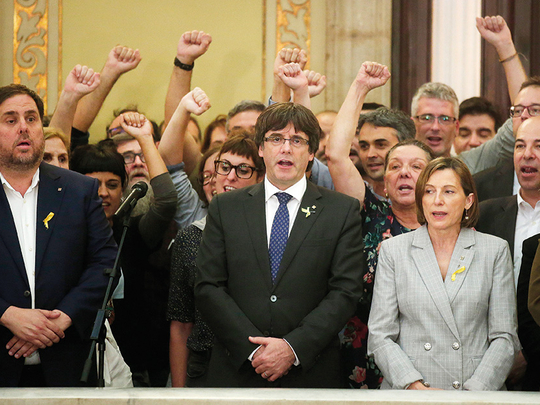
BARCELONA: Catalonia’s separatist leader Carles Puigdemont has dreamed since childhood of independence from Spain.
But the man who has said he is willing to go to jail over the fate of the region has now been removed from office and faces charges of “rebellion” after he and his separatist lawmakers voted to declare Catalonia an independent republic.
The 54-year-old former journalist with the shaggy brown mop of hair has become the face of the Catalan independence movement, both liked and disliked.
“Puigdemont to jail,” defenders of Spanish unity shout regularly.
His secession push has prompted hundreds of companies to flee the region since October 1, when he raised the stakes by holding an independence referendum that was banned by the courts and the central government.
On Friday, Spain’s Prime Minister Mariano Rajoy said he had dissolved the Catalan parliament and called regional elections on December 21 under sweeping powers approved by the Senate to stop the secessionist movement.
Rajoy said he had also formally removed Puigdemont and his executive from office as part of measures to “restore normality” after the Catalan parliament voted to declare independence.
So where does the determination of this married father of two girls come from?
In a biography published in 2016, Carles Porta, a journalist and friend of Puigdemont, describes him as an “honest and resilient” man, a dyed-in-the-wool partisan of independence.
“He has this quality (or this flaw): he’s stubborn,” Porta wrote.
But a high-ranking critic who knows him but refused to be identified in order to speak freely, said he “does not have much preparation ... to take on this big challenge”, even though he has the independence of Catalonia “in his blood, as a unique driving force”.
Puigdemont’s destiny changed in January 2016 when he was selected to lead a coalition of separatist parties which had won a majority of regional parliament seats, with a mandate to pursue independence.
Mayor of the city of Girona since 2001 and a lawmaker in the regional parliament, Puigdemont replaced Artur Mas as the Catalan president, becoming the Spanish government’s public enemy number one.
He does though share one thing in common with Prime Minister Mariano Rajoy: both suffered serious car accidents when they were younger.
Rajoy has his scars hidden under his beard, Puigdemont on his forehead, under his fringe.
Puigdemont was born in Amer, a small mountain village of 2,200 people, on December 29, 1962, the second of eight siblings.
The son and grandson of bakers, he was just nine when he was sent to boarding school and “learnt to be a fighter”, Porta says.
He was 13 when Spain’s dictator Francisco Franco died in 1975.
Hugely attached to the Catalan language and passionate about history, the teenager would forever remember Franco’s severe repression of the region.
In 1980, he joined Convergencia Democratica de Catalunya, the conservative and nationalist party which became the Catalan European Democratic Party in 2016.
Hired in 1982 by the nationalist newspaper El Punt Avui, he rose up through the ranks and became editor, combining journalism with activism.
At the time, pro-independence Catalans were still a minority.
In the summer of 1991, he travelled to the Republic of Slovenia, which had just declared independence from Yugoslavia after a banned referendum, followed by a brief armed conflict.
In the following years, he sought to widen support for independence, always by peaceful means, inspired by India’s icon, Mahatma Gandhi.
At ease with social media, he also speaks French, English and Romanian — his wife Marcela Topor comes from Romania.
Puigdemont founded a Catalan news agency and an English-language newspaper about the region, and headed up the Association of Municipalities for Independence, which brings together local entities to promote the right to self-determination.
“He has a great flair for showmanship and knows how to use the media,” political analyst Anton Losada said.
Since 2012, Catalonia has been the scene of mass rallies asking for an independence referendum, but the region itself remains deeply divided over splitting from Spain.
For political analyst Joan Botella, “Puigdemont believes he has been called by destiny to take Catalans to the promised land, and his entourage is very unpredictable.”
But “he doesn’t at all appear to be a demented zealot as described by Madrid”.












